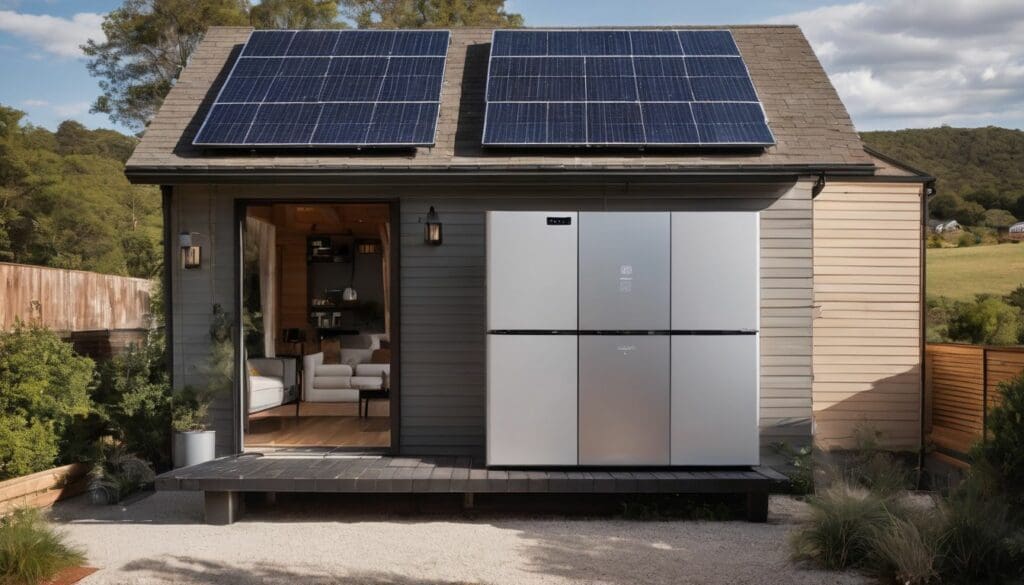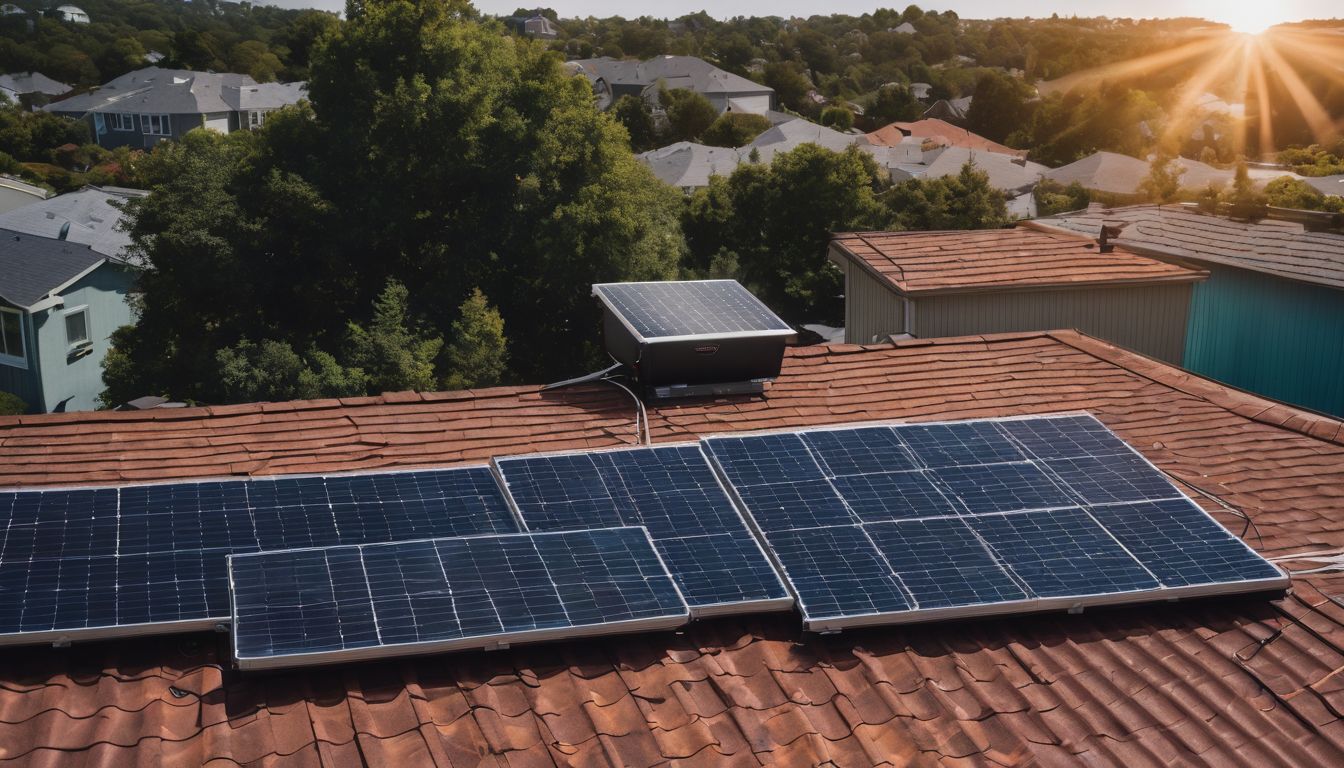As power bills soar, many of us seek ways to cut costs and boost energy independence. Solar battery storage systems can store excess solar energy for later use, offering a smart solution to this modern challenge.
This article illuminates the essentials of solar battery technology, helping you understand and choose the right system for your home. Discover how to harness the sun’s power day and night!
Key Takeaways
- Solar batteries store the sun’s energy so you can use it when there’s no sunlight, like at night or on cloudy days.
- Different types of solar batteries include lead-acid, lithium-ion, saltwater and flow batteries, each with their own cost range and features suitable for different needs.
- Choosing the right battery depends on how much energy you need to store and your budget; higher capacity and efficiency may come with a higher price tag but offer longer life spans and better performance.
- Installing solar batteries at home can reduce electricity bills significantly by using stored solar power during peak times when grid electricity is more expensive.
- Using solar battery systems helps reduce greenhouse gas emissions by decreasing reliance on fossil fuels for power generation.
Understanding Solar Batteries
Solar batteries store excess solar energy generated by photovoltaic panels during the day for use at night or during cloudy days. They work by converting and storing DC power from solar panels into AC power that can be used to power home appliances.
There are different types of solar batteries available, ranging in costs depending on capacity and technology.
How they work
Solar batteries store energy from the sun during daylight using photovoltaic panels. These panels convert sunlight into electricity, which then charges the battery for later use. At night or on cloudy days when solar panels can’t generate power, the stored energy becomes your home’s source of power.
Charging and discharging cycles are key to how these systems function. The cycle begins again each day as sunlight hits your panels, ensuring a renewable energy source that reduces reliance on fossil fuels.
This continuous loop offers you utility grid independence and supports sustainable living by harnessing clean energy directly from our greatest natural resource: the sun.
Types and costs
When it comes to harnessing solar energy, solar batteries play a crucial role by storing excess power for future use. Different types cater to varying needs and budgets. Below is a summary of the most common types of solar batteries and their associated costs:
| Type of Solar Battery | Description | Approximate Cost Range |
|---|---|---|
| Lead-Acid | These are the oldest type of rechargeable batteries, known for their high power and low cost. | £100 – £200 per kWh |
| Lithium-Ion | Widely used due to their higher energy density and longer lifespan than lead-acid batteries. | £400 – £800 per kWh |
| Saltwater | A newer type that uses saltwater as the electrolyte, offering a more eco-friendly option. | £200 – £500 per kWh |
| Flow Batteries | They store energy in liquid form, making them ideal for large scale energy storage. | £400 – £1000 per kWh |
Investing in the right type of solar battery can contribute significantly to an environmentally-friendly lifestyle while providing energy security. Keep in mind that prices can vary based on capacity and manufacturer.
Choosing the Right Solar Battery
When choosing the right solar battery, it’s important to consider factors such as capacity, efficiency and safety considerations, as well as warranty and cost. These factors will help you find the best solar battery for your specific energy storage needs.
Factors to consider
Consider your energy needs and usage patterns to determine the required battery capacity. Assess the peak power demands of your household to select a battery with adequate output. Evaluate the efficiency and safety features of different solar batteries before making a decision. Take into account the warranty offered and compare costs across various options. Investigate how the chosen battery aligns with your renewable energy goals.
Types of energy storage
Solar batteries come in various types, including lithium-ion, lead-acid, and saltwater batteries. Lithium-ion batteries are popular for their high energy density and long lifespan, making them suitable for both on-grid and off-grid applications.
Lead-acid batteries are more affordable but have a shorter lifespan compared to lithium-ion options. Saltwater batteries offer a non-toxic and eco-friendly alternative with relatively low maintenance requirements.
When selecting the right solar battery type, you should consider factors such as energy capacity, efficiency, safety features, and cost-effectiveness to meet your specific energy storage needs.
Understanding the differences between these types of energy storage can help you make an informed decision based on your environmental concerns and financial considerations.
Benefits of Solar Batteries
Solar batteries offer the benefit of energy independence, allowing you to store and use solar power even when the sun isn’t shining. This can lead to significant savings on your electric bill and reduce your carbon footprint.
Energy independence
Generating your own solar power and storing it with a battery system can liberate you from reliance on the grid. By harnessing energy from the sun, you gain independence and resilience against potential outages or price fluctuations.
With solar battery storage, you have access to clean, sustainable power even during grid disruptions or peak demand periods.
This leap towards energy self-sufficiency creates a sense of empowerment, allowing you to make informed decisions that positively impact both your budget and the environment. Embracing energy independence enables greater control over your electricity usage while contributing to overall conservation efforts, all while reducing your carbon footprint.
Electric bill savings
Transitioning from the benefits of energy independence, solar battery systems also offer significant electric bill savings. By storing excess solar energy during the day, you can significantly reduce your reliance on grid electricity during peak hours.
This means lower electricity bills and greater control over your energy costs, especially during times when utility rates are at their highest. Additionally, some regions offer incentives or credits to homeowners who generate more solar power than they consume, providing further savings on your electric bill over time.
Choosing a solar battery system that aligns with your household’s energy needs and consumption patterns is crucial in maximising your electric bill savings potential. Integrating an efficient and reliable storage solution can lead to substantial long-term financial benefits while reducing environmental impact.
Reduced carbon footprint
By utilising solar battery storage systems, individuals can substantially reduce their carbon footprint. Storing solar energy for later use decreases reliance on non-renewable energy sources, leading to a significant decrease in greenhouse gas emissions.
This shift towards renewable energy integration is pivotal in combating climate change and ensuring a sustainable future for our planet.
Next, let’s discuss the ways in which solar batteries contribute to energy independence.
Selecting the Best Solar Battery for Your Needs
When selecting the best solar battery for your needs, consider the capacity, efficiency, safety considerations, warranty and cost. These factors will help you make an informed decision on which solar battery is right for you.
Capacity
When selecting a solar battery, consider its capacity to store energy. This refers to the amount of electricity the battery can hold and provide when needed. It’s essential to match the capacity of the battery with your energy usage patterns and needs at different times of day or year.
The capacity determines how long you can power your home solely using stored solar energy, especially during periods of low sunlight or power outages. When choosing a solar battery system, opt for one with sufficient capacity to sustain your household’s electricity requirements efficiently.
Efficiency and safety considerations
When selecting the best solar battery for your needs, it’s essential to evaluate efficiency and safety factors. Look for batteries with high energy conversion rates and low self-discharge levels to maximise energy storage.
Additionally, prioritise safety features such as built-in overcharge protection and durable casing materials to ensure the secure operation of your solar battery system.
Efficiency and safety considerations are paramount when integrating a solar battery into your home energy storage solution. Prioritise lithium-ion batteries known for their high energy density and long cycle life while ensuring that the chosen battery meets all relevant safety certifications.
Warranty and cost
When considering a solar battery, the warranty and cost are critical factors to evaluate. The warranty should provide assurance for an extended period, typically around 10 years or more. Checking for a competitive price that aligns with your budget and offers value in terms of storage capacity is essential.
Understanding the warranty coverage and associated costs is important when determining the long-term benefits of investing in a solar battery system. Considering these elements will help ensure you make a well-informed decision about which solar battery best suits your energy needs and financial considerations.
– Solar Batteries for Home Energy Storage
Solar Batteries for Home Energy Storage
Explore the different types of solar batteries available for home energy storage and learn how to integrate them with your existing solar system to maximise potential savings. For more information on choosing the best solar battery for your needs, continue reading our blog.
Types available
Solar battery storage systems come in different types to suit varying energy needs and preferences, such as lead-acid, lithium-ion, and flow batteries. Each type has its unique features and advantages that cater to specific requirements. Here are the various types of solar battery storage systems available:
- Lead-acid batteries: These traditional batteries are cost-effective and reliable for storing solar energy, making them suitable for off-grid applications.
- Lithium-ion batteries: Known for their high energy density and longer lifespan, these are commonly used in residential and commercial solar installations due to their efficiency.
- Flow batteries: Ideal for long-duration energy storage, they offer flexibility in capacity and provide a sustainable solution for renewable energy integration.
- Saltwater batteries: Environmentally friendly with non-toxic materials, these batteries are gaining popularity for their safety and recyclability while being suitable for residential use.
Integrating with solar systems
When considering integrating solar batteries with your home energy system, it’s important to understand the various types available and how they can be combined effectively. Lithium-ion batteries are a popular choice for integrating with solar systems due to their high energy density and long lifespan.
Additionally, lead-acid batteries are also commonly used for off-grid solar battery systems, offering reliable performance at a lower cost. Matching the right type of battery with your specific energy storage needs is essential for optimising the efficiency and effectiveness of your solar power storage setup.
To integrate solar batteries effectively, it’s crucial to ensure that the chosen system is compatible with your existing solar panels and inverter. This integration will help in maximising renewable energy usage while providing backup power during outages or low sunlight periods.
Cost and potential savings
When considering the cost and potential savings of solar batteries, it’s important to factor in the initial investment as well as long-term benefits such as reduced energy bills and potential government incentives. Here are some key aspects to think about:
- Initial Cost: Evaluate the upfront cost of purchasing and installing a solar battery storage system, including any additional equipment needed for integration with your current setup.
- Energy Savings: Consider the amount of money you can save on your electricity bills by storing excess solar energy during periods of low consumption or high production.
- Government Incentives: Investigate available rebates, tax credits, or other incentives offered by local authorities to support renewable energy storage solutions.
- Energy Independence: Assess the value of being less reliant on grid power during outages or peak demand periods, potentially lowering stress on utility infrastructure.
- Environmental Impact: Reflect on the environmental benefits of reducing carbon emissions through sustainable energy practices and contributing to a cleaner world for future generations.
- Long-Term Gains: Project your potential return on investment over several years, taking into account factors like avoided peak-time charges and rising utility rates.
Conclusion
In conclusion, solar battery storage systems offer a reliable and sustainable solution for off-grid or grid-independent energy needs. With various types available, choosing the right solar battery involves considering factors such as capacity, efficiency, safety, warranty, and cost.
Integrating solar batteries with home energy systems can lead to significant electric bill savings while reducing your carbon footprint. When selecting the best solar battery for your needs, it’s essential to weigh the potential savings against the initial investment for a more efficient and cost-effective solution.
FAQs
1. What is a solar battery storage system?
A solar battery storage system is an energy storage solution that captures solar power and stores it for later use, allowing for both off-grid and grid-tied systems to work efficiently.
2. How does a solar energy storage system benefit me?
Solar energy storage systems provide backup power, help save on electricity costs by storing excess solar energy, and can make your home more self-sufficient.
3. What types of batteries are used in solar power storage systems?
Lithium-ion batteries are commonly used in various types of solar power storage systems because they’re long-lasting and efficient.
4. Can I use a solar battery backup if I’m not connected to the grid?
Yes! With an off-grid solar battery system, you can store enough energy to power your home independently from the public grid.
5. Are there options for integrating a new solar battery with my existing setup?
Certainly! You have various options for adding a state-of-the-art sun-based energy stockpiling framework that works well with different frameworks or updates your current setup.





